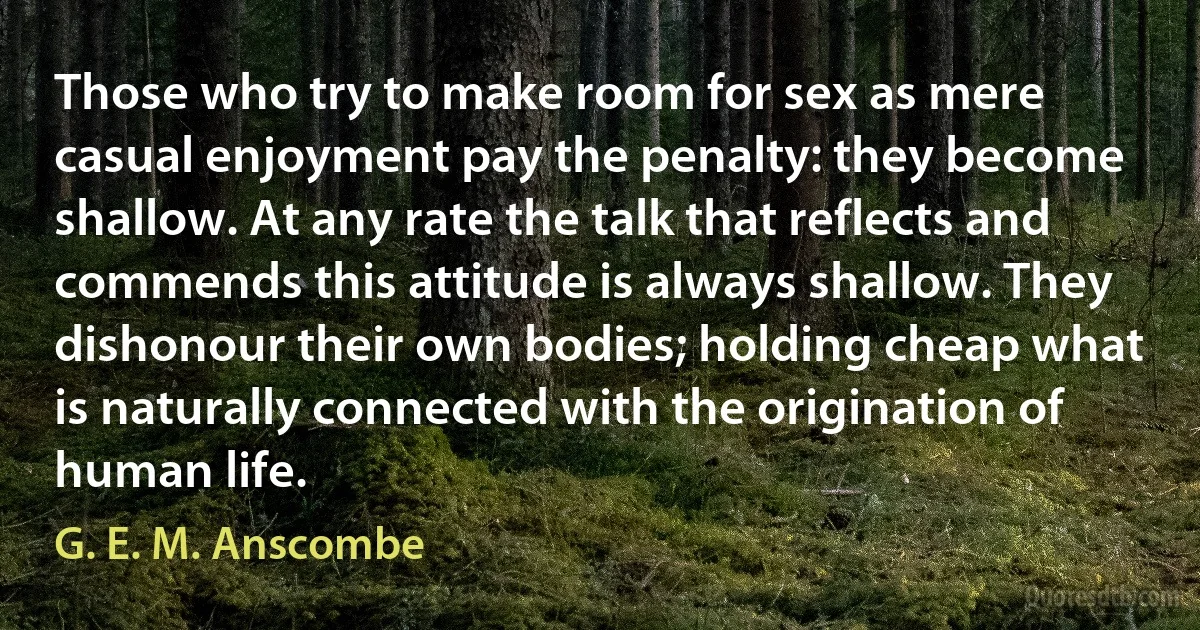G. E. M. Anscombe quotes
G. E. M. Anscombe was a British philosopher renowned for her influential work in philosophy of mind, ethics, and philosophy of action. Her essay "Modern Moral Philosophy" helped revive interest in virtue ethics in the twentieth century. She remains a significant figure in analytic philosophy and a student and translator of Ludwig Wittgenstein. Here are 10 of her quotes:
The denial of any distinction between foreseen and intended consequences, as far as responsibility is concerned, was not made by Sidgwick in developing any one 'method of ethics'; he made this important move on behalf of everybody and just on its own account; and I think it plausible to suggest that this move on the part of Sidgwick explains the difference between old-fashioned Utilitarianism and the consequentialism, as I name it, which marks him and every English academic moral philosopher since him.

G. E. M. Anscombe
A severe morality holds that intercourse (and may hold this of eating, too) has something wrong about it if it is ever done except explicitly as being required for that preservation of human life which is what makes intercourse a good kind of action. But this involves thoroughly faulty moral psychology. God gave us our physical appetite, and its arousal without our calculation is part of the working of our sort of life. Given moderation and right circumstances, acts prompted by inclination can be taken in a general way to accomplish what makes them good in kind and there's no need for them to be individually necessary or useful for the end that makes them good kinds of action. Intercourse is a normal part of married life through the whole life of the partners in a marriage and is normally engaged in without any distinct purpose other than to have it, just as such a part of married life.

G. E. M. Anscombe
You can argue truly enough, for example, that general respect for the prohibition on murder makes life more commodious. If people really respect the prohibition against murder life is pleasanter for all of us - but this argument is exceedingly comic. Because utility presupposes the life of those who are to be convenienced, and everybody perceives quite clearly that the wrong done in murder is done first and foremost to the victim, whose life is not inconvenienced, it just isn't there any more. He isn't there to complain; so the utilitarian argument has to be on behalf of the rest of us. Therefore, though true, it is highly comic and is not the foundation: the objection to murder is supra-utilitarian.

G. E. M. Anscombe
But we lay people are not less called to the Christian life, in which the critical question is: "Where does the compass-needle of your mind and will point?" This is tested above all by our reactions when it costs or threatens to cost something to be a Christian. One should be glad if it does, rather than complain! If we will not let it cost anything; if we succumb to the threat of "losing our life", then our religion is indistinguishable from pure worldliness.

G. E. M. Anscombe
There is no such thing as a casual, non-significant sexual act; everyone knows this. Contrast sex with eating - you're strolling along a lane, you see a mushroom on a bank as you pass by, you know about mushrooms, you pick it and you eat it quite casually - sex is never like that. That's why virtue in connection with eating is basically a matter only of the pattern of one's eating habits. But virtue in sex - chastity - is not only a matter of such a pattern, that is of its role in a pair of lives. A single sexual action can be bad even without regard to its context, its further intentions and its motives.

G. E. M. Anscombe
Christian life meant a separation from the standards of that world: you couldn't be a Baal-worshipper, you couldn't sacrifice to idols, be a sodomite, practice infanticide, compatibly with the Christian allegiance. That is not to say that Christians were good; we humans are a bad lot and our lives as Christians even if not blackly and grossly wicked are usually very mediocre.

G. E. M. Anscombe
Implicitly, lasciviousness is over and over again treated as hateful, even by those who would dislike such an explicit judgment on it. Just listen, witness the scurrility when it's hinted at; disgust when it's portrayed as the stuff of life; shame when it's exposed, the leer of complicity when it's approved. You don't get these attitudes with everybody all of the time; but you do get them with everybody.

G. E. M. Anscombe
G. E. M. Anscombe

Photo:
Albarluque,
CC BY-SA 3.0
Occupation: British Philosopher
Born: March 18, 1919
Died: January 5, 2001
Quotes count: 10
Wikipedia: G. E. M. Anscombe









